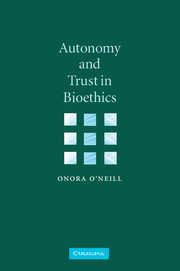Book contents
- Frontmatter
- Contents
- Preface
- Frontispiece
- 1 Gaining autonomy and losing trust?
- 2 Autonomy, individuality and consent
- 3 ‘Reproductive autonomy’ and new technologies
- 4 Principled autonomy
- 5 Principled autonomy and genetic technologies
- 6 The quest for trustworthiness
- 7 Trust and the limits of consent
- 8 Trust and communication: the media and bioethics
- Bibliography
- Institutional bibliography
- Index
5 - Principled autonomy and genetic technologies
Published online by Cambridge University Press: 06 November 2009
- Frontmatter
- Contents
- Preface
- Frontispiece
- 1 Gaining autonomy and losing trust?
- 2 Autonomy, individuality and consent
- 3 ‘Reproductive autonomy’ and new technologies
- 4 Principled autonomy
- 5 Principled autonomy and genetic technologies
- 6 The quest for trustworthiness
- 7 Trust and the limits of consent
- 8 Trust and communication: the media and bioethics
- Bibliography
- Institutional bibliography
- Index
Summary
BEYOND INDIVIDUAL AUTONOMY
Individual autonomy, as we saw in chapters 2 and 3, offers an unsatisfactory approach to many ethical issues that arise in medicine, science and biotechnology. The minimal interpretation of individual autonomy as informed consent provides plausible but very incomplete ethical guidance; more robust interpretations of individual autonomy offer more complete but very implausible ethical guidance. Nor, as disputes about ‘reproductive autonomy’ show, can ethical issues be well resolved merely by limiting the pursuit of individual autonomy by a requirement not to harm.
But will ethical arguments that invoke principled rather than individual autonomy prove either more plausible or more complete? There are at least some reasons to hope that they may. Principled autonomy requires that we act only on principles that can be principles for all; it provides a basis for an account of the underlying principles of universal obligations and rights that can structure relationships between agents.
A primary focus on interaction and relationships, on obligations and rights, does not prevent those committed to principled autonomy from assigning due – but no more than due – weight to individual autonomy. Without some capacities for and some use of individual autonomy (variously interpreted) agents will lack the resolution and the self-confidence to fulfil their obligations and to respect one another's rights. Acting with principled autonomy needs a modest capacity for individual autonomy; but that necessary minimum is only one minor aspect of principled autonomy.
- Type
- Chapter
- Information
- Autonomy and Trust in Bioethics , pp. 96 - 117Publisher: Cambridge University PressPrint publication year: 2002



